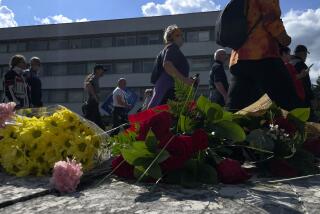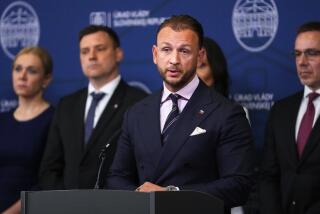NEWS ANALYSIS : Belgrade Ties Frayed on Panic Issue : Politics: Premier’s survival may indicate maneuvering to undercut Serb strongman Milosevic.
- Share via
BELGRADE, Yugoslavia — In the conspiracy-laden world of wartime Balkan politics, the only version of perplexing events that can usually be discounted is the one being publicly touted.
Few believe the official line in the case of Yugoslav Prime Minister Milan Panic, who, according to state-run media, deftly deflected a no-confidence vote by Serbian nationalists in Parliament last week with convincing arguments that they were risking further international isolation.
The widely held view is that Serbian President Slobodan Milosevic, outraged over his humiliation at the hands of Panic during a London conference on the Yugoslav crisis the previous week, tried but failed to get rid of his increasingly popular rival.
Deputies from Milosevic’s Serbian Socialist Party called for the vote against Panic and accused him of selling out Serbian interests at the meeting in London. They later withdrew their demand for censure, allowing Panic to emerge victorious and seemingly the man in control.
But Milosevic has been the strongman of the Balkans for five years chiefly through masterful power play and cool calculation. He has never been known to react emotionally or blunder so destructively as to seek the ouster of the one man who buys some legitimacy for the Belgrade regime.
*
Another theory being pored over by political pundits and Western diplomats is that Milosevic is being edged aside by Yugoslav President Dobrica Cosic, the ideological godfather of the quest for a Greater Serbia that may suffer setbacks as Milosevic maneuvers to stay in power.
Milosevic skillfully manipulated Serbian national feelings to provoke ethnic conflicts in Croatia and Bosnia-Herzegovina that allowed Serbian guerrillas to seize huge swaths of land for a Greater Serbia. Radicals then expelled other ethnic groups with the deadly practice of “ethnic cleansing” to ensure a durable Serbian grip on the conquered territory.
War crimes blamed on Serbs have shocked the outside world and exposed Serb-run Yugoslavia to harsh sanctions. As popular support for Milosevic has flagged as a result of the punishment and isolation, the Serbian president has cut back assistance to the proxy warlords in Croatia and Bosnia and apparently abandoned the goal of an expanded Serbia.
Those who see the hand of Cosic in the Panic affair believe the president staged the failed palace coup to bolster Panic’s standing in his clash with Milosevic.
“Cosic understands that he must get rid of Milosevic,” said Dragisa Burzan, an opposition politician from Serb-allied Montenegro who attended the London conference where the public rift in the Belgrade leadership first broke out.
“It was (Cosic’s) idea to bring Panic here, not Milosevic’s,” Burzan explained. “Panic has a mandate--both from the U.S. government and from Cosic--to get rid of Milosevic. Once that is done, Panic appears to have succeeded, which allows Cosic to pursue his dream of Greater Serbia. After all, Panic hasn’t really done anything to prevent that yet.”
The prime minister, a naturalized American citizen who left his California pharmaceuticals empire two months ago to take over the government of his internationally shunned Yugoslav homeland, has promised to stop the war, to work toward undoing the damage of “ethnic cleansing” and to get the United Nations to lift sanctions that have helped pauperize his fellow Serbs.
Foreign government leaders, humanitarian aid officials and most others who have met Panic describe him as well-intentioned and unlikely to have consciously agreed to act as a foil for the nationalist radicals who have dismembered Yugoslavia and set its various religious and ethnic groups against each other.
They concede, however, that little of what he promised has been fulfilled.
“I trust him. I am especially impressed with some of his political appointments, like the new justice minister,” said one official of the Office of the U.N. High Commissioner for Refugees. “Whether he actually has the power to change anything remains to be seen. All we can do is hope.”
The theory that Cosic is pulling the political strings would mean that Panic is living on borrowed time. He remains useful to the nationalist Yugoslav president as long as he buys time with Western mediators that allows a completion of the conquest of Bosnian land for Greater Serbia.
*
As soon as Panic becomes a real obstacle to cementing the war gains, a European diplomat said, he will be as unceremoniously dumped as was Ante Markovic, the last Yugoslav prime minister who tried to undermine Serbian nationalism with the alternative of prosperity and reform.
Panic has repeatedly insisted he is nobody’s puppet and that he was brought in by Cosic to end the war and restore order.
Saying he is not one to make empty promises, Panic told reporters Thursday: “I’m going to start delivering the deeds.”
The 62-year-old prime minister was taking the weekend off to rest and was therefore unavailable to discuss the events of the past week, said his spokesman, David Calef. But he said Panic was pleased with the show of parliamentary support.
While the scenario employing Cosic as senior power broker is complicated enough, another interpretation of the failed no-confidence motion spins an even more intriguing tale and casts Milosevic in his more familiar role as master tactician under fire.
That theory suggests Milosevic orchestrated the parliamentary assault on Panic to discredit the Serbian Radical Party with which he has previously been aligned.
The Radicals are headed by ultranationalist Vojislav Seselj, whose paramilitary White Eagles were openly engaged in Bosnian war crimes. That has made Seselj’s perceived alliance with Milosevic a liability for all figures in the Belgrade regime.
Seselj was one of the 68 deputies to propose the no-confidence vote against Panic, accusing him of “carrying out orders from some enemy Western powers” by suggesting acceptance of the prewar republic borders as a means of establishing peace.
The Socialist caucus loyal to Milosevic later rescinded its support for the move against Panic, but Seselj and the other 30 Radical Party members in Parliament voted against him and marked themselves as a faction against peace.
Milosevic may have duped Seselj into leading the attack on Panic. That would distance him from Seselj.
Because Panic is popular with the growing number of Serbs tired of war and the poverty and isolation it has imposed, Seselj may now be politically expendable for having sought to depose Belgrade’s self-styled “man of peace.”
By making Seselj the fall guy for the atrocities committed by various pro-Milosevic forces in Bosnia, all major players on the Belgrade political stage would enhance their powers: Milosevic would retain rule of Serbia while getting rid of an inconvenient ally; Serbian rebel leaders in Croatia and Bosnia would still control the war spoils crucial to Cosic’s expansionist drive, and Panic would be elevated in the esteem of his countrymen, at least as long as his presence shields the nationalist maneuvering behind the scenes.
More to Read
Sign up for Essential California
The most important California stories and recommendations in your inbox every morning.
You may occasionally receive promotional content from the Los Angeles Times.














